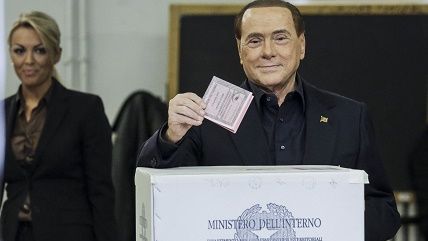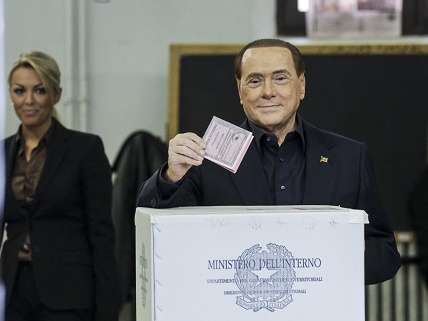Italy Rejects Constitutional Reform Referendum—A Victory for Democracy, or Russia, or Who Knows What
But not a victory for the establishment.


Voters in Italy rejected a referendum on constitutional reforms advanced by the government of Matteo Renzi, on whose rule the referendum became a referendum, and who announced his resignation in the wake of the results.
Various Italian governments in the last decades have pushed the issue of constitutional reform—in 2011, voters rejected an effort by then-Prime Minister Silvio Berlusconi to, among other things, make the prime ministership stronger at the expense of the presidency. Like the present effort, it was framed as a way to make governing Italy easier. Former Obama campaign manager Jim Messina advised the pro-yes effort (he also worked on David Cameron's re-election and the Brexit Remain campaign), and Renzi visited the White House for a state dinner in October. The U.S. ambassador to Italy warned that a no vote could make it harder for Italy to attract foreign investment from places like the U.S.
One of the key points in this reform effort was reducing the size and power of the Senate. The two chambers of the Italian legislature are currently considered 'perfectly symmetrical'—members of both chambers are elected at the same time for the same length terms, and both chambers have to pass the same piece of legislation for it to move on. The legislation passes from chamber to chamber until the two have passed the same bill, a process known as the "parliamentary shuffle," which can go on indefinitely. The proposed reforms would cut the Senate out of the process for a whole set of legislative issues, shrink the chamber, and fill it with regional assembly members and mayors. The reform would also award extra seats to the best performing party in the chamber of deputies, making it easier to put together stronger governments.
The reforms were opposed by a cross-section of Italian political life, from the Northern League's Matteo Salvini to economist Mario Monti, who was selected to replace Berlusconi as prime minister, and previously served on the European Commission from 1995 to 2004, as well as members of Renzi's Democratic party. The Economist recommended a no vote. Meanwhile, opponents framed a "no" vote as another signpost on the road to populism, because of a perception that populist parties could benefit most from the prime minister's resignation, the consequent uncertainty, and a potential snap election.
After the results were announced, Salvini tweeted "Viva Trump, viva Putin, viva la Le Pen e viva la Lega!" Beppe Grillo, a comedian who helped start a left-wing populist party, the Five Star Movement, meanwhile, called the vote a victory for democracy. The mentions of President-elect Trump, Russia President Vladimir Putin, and France's Marine Le Pen are a reference to the apparent confluence of interests of anti-globalist, populist and nationalist-type movements across the West. Like the attempt by some to connect Brexit to Trump, these kind of exercises don't work. While UKIP's Nigel Farage became a fast friend of Trump's, the Conservative Daniel Hannan, another pro-Brexit British politician, called Trump's rise a danger to the Republican party and American democracy and rejected parallels between Trumpism and Brexit as "absurdly overdone."
Salvini's attempt to align the no vote with Trump, Putin, and France's National Front, , also illustrates the danger of opponents of reflexive anti-establishmentarianism who themselves reflexively lump disparate political movements and forces into one basket of deplorables. Last month, the Washington Post ran a story about "fake news" as part of a massive Russian propaganda effort, based in large part on a report by PropOrNot, a group that has kept the identity of its members a secret and has been accused itself of being a Ukrainian propaganda effort, that identified more than 200 websites as "routine peddlers of Russian propaganda during the election season." As The New Yorker's Adrien Chen noted last week, for PropOrNot "simply exhibiting a pattern of beliefs outside the political mainstream [was] enough to risk being labelled a Russian propagandist."
This kind of "you're either with us or against us" approach to a (bigger government) "political mainstream" that is increasingly no such thing doesn't earn that position any more credibility. Voters in Italy were, by a margin of almost 20 percent, not interested in changing their constitution to make governing easier for the ruling party. This despite the usual economic doom and gloom that accompanies a vote outside of, in Europe's case, the Euro-integrationist mainstream. In Italy, the threat is argued to be because a "no" vote makes eventual departure from the Eurozone more plausible (though still unlikely), which in turn would make it more difficult to bail out Italian banks now seeking them.
At its most basic level, it's a similar argument made in the 2008 fiscal crisis—that if the government didn't intervene aggressively there would be catastrophe. It's also similar to arguments deployed wherever there's a case being made for more government intervention—that inaction is too dangerous, and the government has to "do something." It's a dangerous conceit, and one that becomes less persuasive the more government, as it is wont to do, fails, and the more that the world get better despite big government's best efforts.
Editor's Note: As of February 29, 2024, commenting privileges on reason.com posts are limited to Reason Plus subscribers. Past commenters are grandfathered in for a temporary period. Subscribe here to preserve your ability to comment. Your Reason Plus subscription also gives you an ad-free version of reason.com, along with full access to the digital edition and archives of Reason magazine. We request that comments be civil and on-topic. We do not moderate or assume any responsibility for comments, which are owned by the readers who post them. Comments do not represent the views of reason.com or Reason Foundation. We reserve the right to delete any comment and ban commenters for any reason at any time. Comments may only be edited within 5 minutes of posting. Report abuses.
Please to post comments


Making it easier for government to make laws is the same thing as making it easier for toddlers to acquire flamethrowers.
Toddlers have a much better track record in being "good" (not evil) than governments do.
Dana Rohrabacher is now frontrunner for SecState
Rohrabacher, probably most known for his legislation to decriminalize pot, has long been in "libertarian" or "semi-libertarian" category of the GOP. A committed anti-communist, it is probably his interventionist views that most identify him as not a "true" libertarian. Better than Bolton and neo-cons, however.
How is that going to work out with Jeff "good people don't smoke marijuana" Sessions?
simply exhibiting a pattern of beliefs outside the political mainstream [was] enough to risk being labelled a Russian propagandist
Ahh, so if you aren't a full-fledged supporter of the Bush-Clinton-Obama-Merkel New World Order, you may not necessarily be a Russian propagandist, however you're still "outside the political mainstream".
Gee whiz, thanks a lot for the backhanded compliment there, Adrien Chen.
You know who else was out of the political mainstream...
You know who else questioned who else was out of the political mainstream...
2016 keeps giving us surprises. Wonder what we're gonna get for christmas?
Former Obama campaign manager Jim Messina advised the pro-yes effort (he also worked on David Cameron's re-election and the Brexit Remain campaign)
A real winner, that one.
I think we have good evidence that he might not have been the difference maker in the Obama election.
If you attach yourself to lost causes too often you become the lost cause.
He hasn't been shit since he broke up with Kenny Loggins.
I know that the Brexit/Trump/LaPen/whatever pithy name is applied to this, are part of any concerted political movement. It is interesting thato they seem they coincide so closely, though.Did all of the West piss their respective populautions off at the same time? Or is this some sort of reaction to the rise of militant Islam and/or a delayed reaction to the last economic downturn?
* are not...
Crimminy.
Preference cascade?
The million-dollar question, really, and I'd love to hear the views of any Europe-based H on it. My own guess would be some combination of anti-Muslim immigrant sentiment, suspicion towards the EU after the sovereign debt crises in some member countries, and the broader wave of populism that started with the Arab Spring. But take that as pure speculation: I haven't been to Europe in years, and can't offer any first-hand insight.
What's an H? Words got left out of "HyR blogger"?
I suspect it's more closely tied to the latter. Tied to a bunch of other phenomena. Essentially, Western elites marketed managed globalization to their publics based on promises of peace, prosperity and freedom. The financial crises (US and EU) represented a pretty significant failure of that promise for a lot of the public. As has the rise of radical Islam. Far from being chastened by failure, however, many of those elites responded with indifference, demands for even greater authority, and assertions that complaints reflected a moral failure of those complaining.
"framed as a way to make governing Italy easier"
Especially with regard to train schedules?
Well, whatever. Sounds as though Italians got it right.
I get paid ?85 every hour from online jobs. I never thought I'd be able to do it but my friend AT is earning ?10k /monthly by doing this job and she showed me how. Try it out on following website?O2
======================> http://www.homejobs7.com
a way to make governing Italy easier
Well there's a scary sentence.
I'd love an effort to make governing the U.S.A. harder.
How was "best performing party" to have been determined? Is that just a euphemism for some political criterion like election outcomes, or was it really to have been some sort of merit criterion?